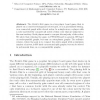1033 search results - page 47 / 207 » Stop the numbers game |
CORR
2010
Springer
15 years 1 months ago
2010
Springer
Huffman coding is often presented as the optimal solution to Twenty Questions. However, a caveat is that Twenty Questions games always end with a reply of "Yes," whereas ...
94
Voted
MIDDLEWARE
2005
Springer
15 years 7 months ago
2005
Springer
Building a distributed middleware infrastructure that provides the low latency required for massively multiplayer games while still maintaining consistency is non-trivial. Previous...
145
click to vote
CAAN
2004
Springer
15 years 7 months ago
2004
Springer
Imagine a set of self-interested clients, each of whom must choose a server from a permissible set. A server’s latency is inversely proportional to its speed, but it grows linear...
116
click to vote
FUN
2010
Springer
15 years 6 months ago
2010
Springer
The Honey-Bee game is a two-player board game that is played on a connected hexagonal colored grid, or in a generalized setting, on a connected graph with colored nodes. In a singl...
123
click to vote
UAI
2004
15 years 2 months ago
2004
Action-graph games (AGGs) are a fully expressive game representation which can compactly express both strict and context-specific independence between players' utility functi...



